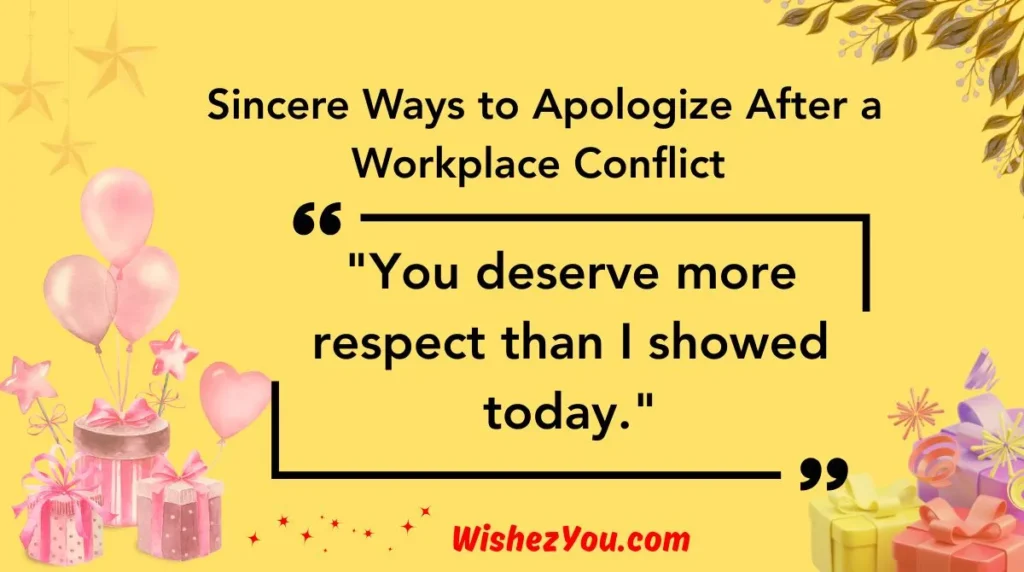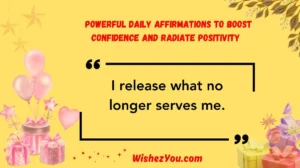Workplace conflict happens to everyone. Whether it’s a heated meeting or a quiet misunderstanding, knowing how to apologize matters
. A good apology can fix relationships, restore trust, and make you look more professional and emotionally intelligent.
It’s not about saying “I’m sorry” once and hoping things go back to normal. It’s about saying it right—with clarity, care, and confidence.
This guide gives you over 142 heartfelt and professional ways to apologize after a workplace conflict.
These messages will help you smooth over tension, rebuild bridges, and create a more positive work environment. They’re short, sincere, and easy to use in emails, meetings, or chats.
✅ Benefits of Reading Good Messages
- 💼 Builds trust and teamwork
- ✨ Shows emotional intelligence
- 💬 Helps you express regret clearly
- 🔄 Turns mistakes into growth moments
- 🧠 Lowers workplace stress
- 🤝 Repairs damaged professional relationships
- 🎯 Keeps communication focused and calm
- 🚫 Avoids awkward silence or tension
- 🙋 Boosts personal accountability
- 🌟 Improves your workplace image
- 🔧 Resolves issues faster
- 🕊 Creates peace and understanding
- 📈 Enhances leadership reputation
- 💡 Teaches empathy
- 🌐 Great for remote work or team chats
- 📩 Useful in emails or Slack
- 📣 Encourages honest conversations
- 📘 Helps you learn from conflict
💎 Best Picks: 10 Polite Apology Messages After Workplace Conflict
- “I truly regret how things went earlier. I value our working relationship and want to make it right.”
- “I’m sorry for raising my voice. That wasn’t fair, and I’ll do better moving forward.”
- “My tone wasn’t right today. I apologize and appreciate your patience.”
- “I acted out of stress, not malice. I’m really sorry, and I respect you deeply.”
- “I let my emotions get ahead of me, and I apologize for how I handled things.”
- “That wasn’t my best moment. I apologize for any hurt or confusion I caused.”
- “Let’s clear the air. I’m sorry for how I spoke and want to start fresh.”
- “I take full responsibility for what happened. I’m committed to making amends.”
- “Please accept my sincere apology. I value our collaboration and don’t want conflict between us.”
- “I realize I crossed a line. I’m sorry for that and open to talking when you’re ready.”
🔎 How to Apologize Professionally in the Workplace
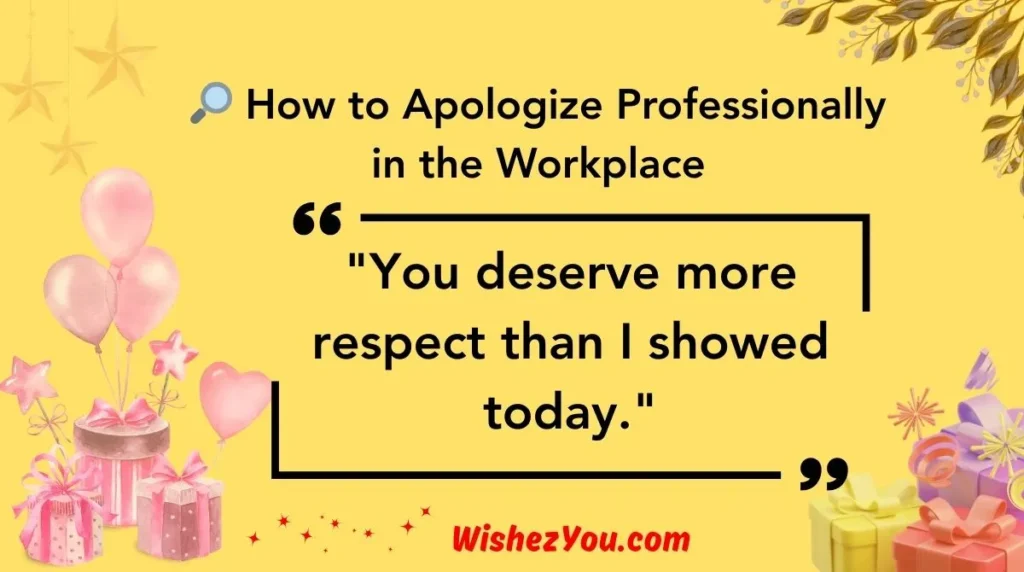
- “I’d like to apologize for the misunderstanding and hope we can move forward with better clarity.”
- “I misread the situation and handled it poorly. I’m truly sorry.”
- “Please accept my apology. I understand my reaction caused discomfort.”
- “I take responsibility for my actions earlier. That’s not how I want to work with you.”
- “I regret my tone in the meeting today. It was uncalled for.”
- “I’m learning from this mistake and will make sure it doesn’t happen again.”
- “I’m sorry for interrupting and speaking out of turn. It won’t happen again.”
- “Your concerns are valid, and I apologize for brushing them aside.”
- “I’ve taken some time to reflect, and I owe you a sincere apology.”
- “I never meant to offend you. I’m really sorry for the impact of my words.”
- “You deserve more respect than I showed today.”
- “My comments were out of line, and I regret making them.”
- “I understand your frustration, and I own my part in it.”
- “Apologies for being reactive. I should have listened better.”
- “I was unprofessional in my response. I’m sorry.”
- “Thank you for being patient—I know I messed up.”
- “I’m committed to resolving this the right way.”
- “Let’s move forward with clearer communication.”
📩 Email Apology Messages to Coworkers
- “Hi [Name], I want to apologize for the tone in our last conversation. It wasn’t right. Let’s reset.”
- “I’m sorry for the misunderstanding. I value your input and want to collaborate better.”
- “Please accept my sincere apology. I regret the way I spoke during the call.”
- “I’ve had time to think about what happened. I handled it poorly, and I’m sorry.”
- “I’m committed to improving how I communicate with you.”
- “I spoke in haste, and I now see it wasn’t helpful. Sorry again.”
- “I want to express my regret and clear up any tension between us.”
- “You deserve a better response than I gave yesterday. My apologies.”
- “Apologies for the stress I may have added to your day.”
- “I acted out of frustration, and that wasn’t fair to you.”
- “Thanks for hearing me out despite how I acted.”
- “I’ve taken your feedback to heart and will work on improving.”
- “Apologies for missing the mark in our discussion today.”
- “I really want to rebuild our working relationship.”
- “Sorry for letting my emotions drive my reaction.”
- “Please know it wasn’t personal—I just handled it wrong.”
- “Let’s work toward a better understanding moving forward.”
- “Thanks for your professionalism—I’ll match it better next time.”
🤝 Apology Messages to Boss or Supervisor
- “I want to sincerely apologize for my behavior in the meeting. I’ll work to do better.”
- “That wasn’t my finest moment. I’m sorry for letting frustration show.”
- “Thank you for your patience—I recognize I was out of line.”
- “I respect your position and regret how I spoke to you.”
- “Please accept my apologies. I didn’t handle the issue professionally.”
- “I should have brought the concern to you differently.”
- “I realize now my tone was inappropriate. I’m working on improving that.”
- “Apologies for reacting instead of responding.”
- “You deserve respect and professionalism. I failed to show that—I’m sorry.”
- “Thanks for the feedback. I’m taking it seriously.”
- “I overstepped, and I’m truly sorry for that.”
- “I’ve reflected and know I owe you an apology.”
- “Please know I’m committed to positive communication moving forward.”
- “I appreciate your leadership, and I want to match that with better conduct.”
- “Sorry for putting you in a tough position due to my reaction.”
- “I’ll make it a point to manage conflict better.”
- “That was uncalled for. I’ll own it and fix it.”
- “Apologies, and thank you for your continued support.”
🌿 Sincere Ways to Apologize to Someone
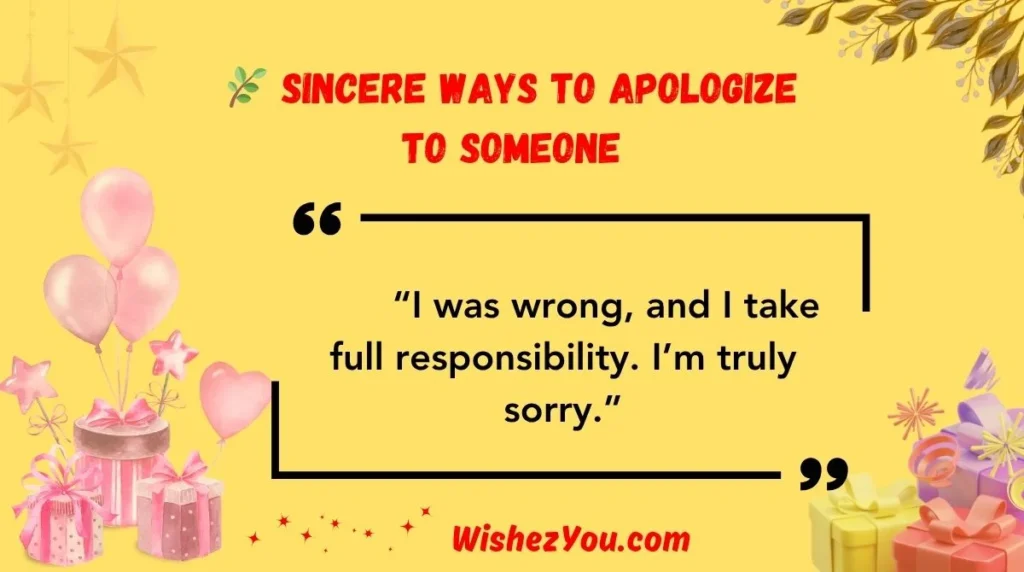
1️⃣ “I was wrong, and I take full responsibility. I’m truly sorry.”
2️⃣ “Please forgive me for my behavior — it was never my intention to hurt you.”
3️⃣ “I’ve had time to think, and I realize how much I hurt you. I regret it deeply.”
4️⃣ “I understand your feelings, and I’m genuinely sorry for what I did.”
5️⃣ “I’m not asking to erase the past, only for a chance to make it right.”
6️⃣ “You didn’t deserve the way I acted. I apologize sincerely.”
7️⃣ “If I could take it back, I would in a heartbeat.”
8️⃣ “Please know my apology comes from the heart, not from guilt.”
9️⃣ “I value you and our connection — I’m sorry for jeopardizing it.”
🔟 “I see my mistake clearly now, and I’m learning from it.”
11️⃣ “I hope you can find it in your heart to forgive me.”
12️⃣ “I’m ready to make amends and rebuild the trust I broke.”
13️⃣ “I’ve learned my lesson — I’ll do better next time.”
14️⃣ “I didn’t mean to hurt you, but I understand that I did. I’m sorry.”
15️⃣ “I’m grateful for the chance to say sorry and start over.”
🧠 Messages After Emotional Outburst
- “I’m sorry for the outburst—it was unprofessional and unfair to you.”
- “I let my emotions get the best of me. I regret that deeply.”
- “I had a rough moment, but it’s not an excuse. Please accept my apology.”
- “That behavior was out of line. I’m truly sorry.”
- “You didn’t deserve to be on the receiving end of that.”
- “I’m working on better emotional control. Apologies for the slip-up.”
- “Thanks for bearing with me during a tough moment—I’m sorry.”
- “My behavior was not aligned with our work values. I apologize.”
- “I’m grateful you stayed calm, even when I didn’t.”
- “I’ll take responsibility for what happened.”
- “I’ll reflect on my triggers and work to manage them better.”
- “My reaction was disproportionate. Sorry for causing discomfort.”
- “Emotions ran high—I acted poorly. Apologies.”
- “I’ve learned from this and hope to show that going forward.”
- “Thanks for your grace—I’m committed to self-improvement.”
- “I want to do better, and I will.”
- “That’s not who I want to be. I’m really sorry.”
- “I’d like a chance to start again with calm and respect.”
🌐 Apologies During Remote Work or Slack
- “I want to clear up tension from earlier—apologies if my message came off harsh.”
- “Sorry for the tone in the last thread. I didn’t mean it that way.”
- “That wasn’t well-worded. My apologies.”
- “Let me rephrase—sorry if I sounded dismissive.”
- “I realize my emoji choice didn’t help. Apologies.”
- “Miscommunication happens, but I take responsibility for my part.”
- “Thanks for calling that out—I’ll watch how I write in chat.”
- “I should’ve clarified instead of reacting. My bad.”
- “Apologies, I read your message wrong.”
- “Remote can be tricky—I didn’t mean offense.”
- “Let’s reset and chat clearly.”
- “Appreciate your patience, and sorry for the confusion.”
- “That wasn’t my intention at all—sorry for how it came across.”
- “Thanks for your grace. Apologies again.”
- “Let’s move forward with clearer context.”
- “I value your input—I didn’t show that clearly.”
- “Sorry for the Slack storm. I’ll be more mindful.”
- “Next time, I’ll take a breath and clarify.”
🧭 Short and Quick Apologies (When Time Is Limited)
- “Sorry about that earlier. Let’s move forward.”
- “Didn’t mean to snap—my apologies.”
- “I was wrong there. Sorry.”
- “Let’s clear the air. I’m sorry.”
- “My bad. Won’t happen again.”
- “Apologies. That was off.”
- “Should’ve handled that better. Sorry.”
- “Quick note—I’m sorry for the mix-up.”
- “Thanks for your patience—I goofed.”
- “Hey, I owe you an apology.”
- “Sorry about the tone.”
- “I get it now. My mistake.”
- “Sorry for overstepping.”
- “I messed up. That’s on me.”
- “Apologies if I came off strong.”
- “Let’s reset—sorry again.”
- “That wasn’t fair of me. Sorry.”
- “Not proud of that moment—apologies.”
💡 Thoughtful Apologies That Show Growth
- “This experience has taught me a lot. I appreciate your understanding.”
- “Your feedback helped me reflect deeply. I’m sorry and grateful.”
- “I’m working on listening more and reacting less.”
- “Thanks for holding me accountable. I want to grow.”
- “I want to rebuild trust through my actions.”
- “What I did wasn’t right, and I’m working on change.”
- “This conflict helped me see my blind spots. Thank you.”
- “I’ve started journaling to manage these moments better.”
- “I’m committed to real improvement, not just words.”
- “Your patience means more than you know—thank you and sorry.”
- “Apologies, and here’s what I’m doing to avoid it again…”
- “Let’s work together to avoid this in the future.”
- “I’ve spoken to a mentor about this and learned a lot.”
- “Thanks for the opportunity to reflect. I’m sorry.”
- “I respect you more now than ever.”
- “My reaction was off, but my growth is real.”
- “You’ll see positive change—thank you for being part of that.”
- “Apologies again—and thank you for the growth moment.”
🗣 Messages to Help Restart the Conversation
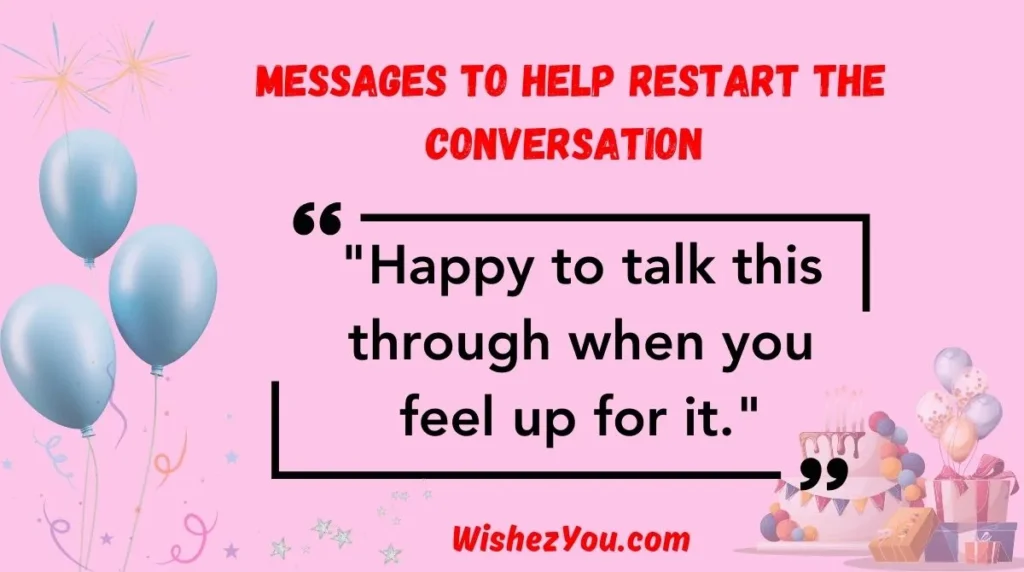
- “Can we talk? I’d like to apologize and move forward.”
- “I owe you a conversation and an apology.”
- “Let’s clear this up—whenever you’re ready.”
- “Happy to talk this through when you feel up for it.”
- “I want to listen better this time.”
- “Let’s reset our working relationship.”
- “Can we schedule a short chat?”
- “You’ve been gracious—I’d like to make it right.”
- “Ready to start fresh. I’m sorry.”
- “Let’s build something better from this.”
- “I want to understand your perspective.”
- “We both deserve better communication—let’s talk.”
- “Apologies again. Are you open to a chat?”
- “How can I make this right?”
- “Thanks for your time—I’d love to reconnect.”
- “Please let me know if we can revisit this calmly.”
- “Open to hearing how I impacted you.”
- “I want to rebuild trust together.”
💞 Sincere Ways to Apologize to Someone You Love
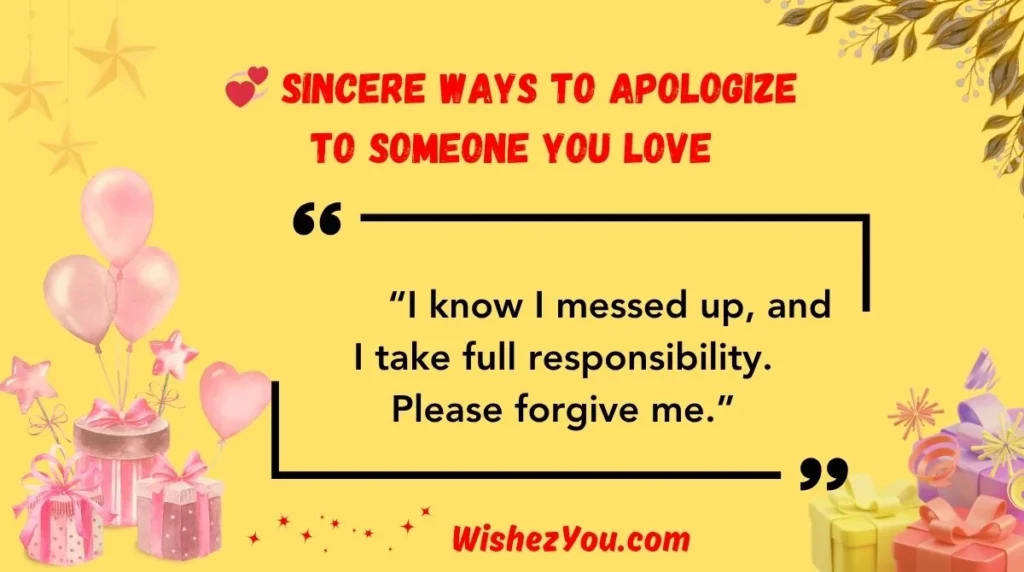
1️⃣ “I’m truly sorry for hurting you — you mean the world to me.”
2️⃣ “I know I messed up, and I take full responsibility. Please forgive me.”
3️⃣ “I never meant to make you feel unloved or disrespected. I’m deeply sorry.”
4️⃣ “You didn’t deserve my words or actions. I regret them deeply.”
5️⃣ “I realize now how much pain I caused, and I want to make it right.”
6️⃣ “Please know that my heart aches for the hurt I brought you.”
7️⃣ “I can’t change the past, but I promise to do better in the future.”
8️⃣ “You are too precious to lose over my mistake. I’m truly sorry.”
9️⃣ “I’m not perfect, but my love for you is. Please forgive me.”
🔟 “I hurt you, and that hurts me too. I’ll never take your love for granted again.”
11️⃣ “I understand how my actions affected you. I’m ready to listen and learn.”
12️⃣ “You deserve my best, not my mistakes. I’m sorry for letting you down.”
13️⃣ “My apology is not just words — it’s a promise to change.”
14️⃣ “Please give me a chance to show you how much you mean to me.”
15️⃣ “I love you deeply, and I hope we can heal together.”
❓ FAQs
What’s the best way to apologize at work?
Keep it short, sincere, and respectful. Own your actions and avoid excuses.# Should I apologize in person or by email?
If possible, apologize in person. If not, a well-written email is fine—just be clear and respectful.
Can a sincere apology help my career?
Yes. Apologizing well shows leadership, accountability, and emotional intelligence.
What if my apology isn’t accepted?
Stay respectful. Give the person space and let time and consistent actions rebuild trust.
How soon should I apologize?
As soon as possible—don’t let tension build. The sooner, the better.
✅ Conclusion
Saying sorry at work isn’t weakness—it’s strength. A sincere apology can turn conflict into connection. Whether you send an email, message a coworker on Slack, or speak face-to-face, the way you express your regret makes all the difference.
Use these 142+ apology messages to rebuild bridges, fix workplace tension, and show your professionalism. With the right words, you can move forward with trust, clarity, and growth. 🌱
